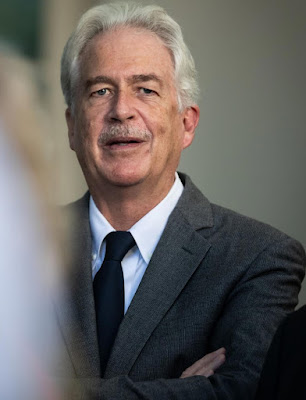The Washington Times published my On Crime column on three books on war and government.
You can read the column via the below link or the below text:
Three books on war and government - Washington Times
Back in 1991, before I became a full-time writer, I was a Defense Department civilian employee. I recall attending a Defense Department conference in Memphis, Tennessee, where I heard an Army colonel speak. The colonel was the military assistant to then-Secretary of Defense Dick Cheney.
In the Q&A period, I mentioned to
the colonel that I was reading Bob Woodward’s new book, “The Commanders,” a
nonfiction work about President George H.W. Bush, Mr. Cheney, Gen. Colin
Powell, other administration leaders and the lead-up to Operation Desert Storm.
I asked him if the quotes from the Defense Department leaders were accurate.
He replied that they were.
I followed up by asking why the senior
leaders spoke to Mr. Woodward for the book, as he was not considered a friend
of the Bush Defense Department. He replied that Mr. Woodward’s books were
popular and highly regarded, so the Defense Department leaders wanted to be
included in “The Commanders” and be a part of history.
Bob Woodward’s new book, “War,” is
similar to “The Commanders,” and recounts President Biden and his
administration’s actions and conversations in the lead-up to Russia’s invasion
of Ukraine, the horrendous Hamas attack on Israel and the Jewish state’s military
response.
The reader can be privy to Defense
Secretary Lloyd Austin’s telephone conversation with his Russian counterpart in
October 2022. Mr. Austin was concerned about Russia’s potential use of a
tactical nuclear bomb in its war with Ukraine.
“If you did this, all the restraints
that we have been operating under in Ukraine would be reconsidered,” Mr. Austin
told Russian Defense Minister Sergei Shoigu. “This would isolate Russia on the
world stage to a degree you Russians cannot fully appreciate.”
“I don’t take kindly to being
threatened,” Mr. Shoigu responded.
“Mr. Minister,” Mr. Austin replied, “I
am the leader of the most powerful military in the history of the world. I
don’t make threats.”
In another section of “War,” Mr. Biden
informs his aides of his view of Russian strongman Vladimir Putin: “Putin is
evil. We are dealing with the epitome of evil.”
The book is clearly biased against
former President Donald Trump and favors Mr. Biden. Supporters of the
president-elect, however, might still enjoy reading about the inside story of
the world’s two current major military conflicts.
’Watchdogs’
While performing security work as a
Defense Department civilian in the late 1980s and 1990s, I investigated
Inspector General complaints regarding waste, fraud and abuse.
So it was with some interest that I read Glenn A. Fine’s “Watchdogs: Inspectors General and the Battle for Honest and Accountable Government.”
Mr. Fine, who served as the inspector general of the
Department of Justice from 2000 to 2011 and served as the acting inspector
general of the Department of Defense from 2016 to 2020, writes about his time
as the IG for Justice and Defense, working cases during the wars in Iraq and
Afghanistan, as well as FBI agent and Russian spy Robert Hanssen, and other
high-profile cases.
Mr. Fine explains how IG oversight
investigations improve government operations, deter wasteful spending and
curtail corruption. He also offers several suggestions on how to improve agency
inspector generals.
This interesting and informative book
about IGs is a critical element for good government.
’The
Unvanquished’
Patrick O’Donnell’s “The Unvanquished:
The Untold Story of Lincoln’s Special Forces, the Manhunt for Mosby’s Rangers,
and the Shadow War That Forged America’s Special Operations” is a most
interesting book about the Civil War beyond the big battles such as Gettysburg.
Mr. O’Donnell, a military historian
specializing in special operations, offers a fascinating story about President
Abraham Lincoln’s special forces, the Jessie Scouts.
I don’t believe anyone has covered the
Jessie Scouts so extensively. The Union scouts, spies and special operators
fought the Confederate army’s counterpart, John Singleton Mosby’s Rangers. The
two irregular units performed raids, destroying critical supply lines, and they
performed spy missions, often with the soldiers often wearing each other’s
uniforms to blend in. If captured, the soldiers would be hanged as spies.
Mr. O’Donnell introduces us to memorable characters, such as Union Scout leader Archibald Rowand, the South’s John Mosby and other lesser-known Civil War soldiers, spies and secret operators. Mr. O’Donnell also writes about the Confederate Secret Service, and how they performed election interference in the 1864 race. He covers how the South’s Secret Service and Mosby’s Rangers planned to kidnap Lincoln before there was a plot to assassinate him.
“The Unvanquished” is a well-written,
well-researched and dramatic history of the special operators from the Civil
War.
•
Paul Davis’ On Crime column covers true crime, crime fiction and thrillers.
• •
•
“War”
Bob Woodward
Simon and Schuster, 448 pages, $32
“Watchdogs”
Glenn A. Fine
University of Virginia, 216 pages, $29.95
“The
Unvanquished”
Patrick O’Donnell
Atlantic Monthly Press, 432 pages, $30






.jpg)
.jpg)













.jpg)
